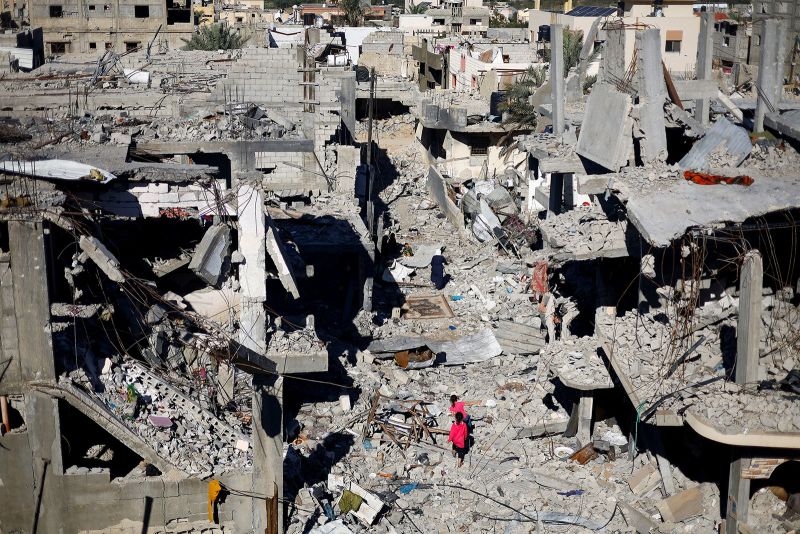
Renewed Conflict: Israel Resumes Military Operations in Response to Hamas as 7-Day Truce Collapses

Israel resumes combat operations in Gaza as 7-day truce collapses, abruptly ending the brief respite and bringing hostilities back to the forefront
Israel's military has announced the resumption of combat operations in Gaza on Friday morning following the breakdown of a temporary truce with Hamas, which had allowed for hostage releases. The strikes have resumed in various areas across Gaza, with military vehicles firing in the northwest, as stated by the Hamas-controlled Ministry of Interior in Gaza.
Israeli Prime Minister Benjamin Netanyahu announced that fighting has resumed against Hamas after the militant group violated the truce agreement by failing to release abducted women and launching rockets at Israeli citizens. He stated that the government's objectives in the conflict are to secure the release of hostages, eliminate Hamas, and ensure the safety of Israeli citizens from future threats from Gaza.
Hamas did not respond immediately to the accusation of launching rockets. If the truce is now permanently broken, the renewed fighting could escalate the ongoing conflict, causing further devastation to Gaza and exacerbating the humanitarian crisis described by the UN Secretary-General as "a crisis of humanity."
Since October 21, a brief ceasefire has permitted over 2,700 trucks to transport much-needed aid from Egypt into Gaza. However, aid agencies stress that this amount is far from enough to meet the needs of the over two million displaced residents, who were already grappling with finding shelter, food, and clean water amidst relentless Israeli airstrikes. The renewed fighting now puts this sole supply line at risk of being cut off once again.
End of brief respite
Israel had made it clear that it would continue its military attack on Gaza if Hamas failed to release 10 hostages for each additional day of ceasefire. As the deadline of 7 a.m. local time (midnight ET) passed, the hostilities resumed almost immediately.
The temporary truce, hard-negotiated and set to end last Friday, was extended by two days after Hamas released some captives. The decision to extend it to a seventh day was made at the last minute on Thursday. This marked the first significant diplomatic progress in the ongoing conflict, which started on October 7 when Hamas militants entered Israel, resulting in the deaths of around 1,200 people, mostly civilians, and the capture of over 200 hostages.
Amid the temporary truce between Israel and the Palestinian Islamist group Hamas, Palestinian children can be seen walking among the houses that were destroyed in Israeli strikes during the conflict, at Khan Younis refugee camp in the southern Gaza Strip on November 29, 2023. The image was captured by REUTERS/Mohammed Salem.
Mohammed Salem/Reuters
US pressing Israel to move civilians out of way if Israel attacks in southern Gaza
The ceasefire provided a brief break for the embattled Gaza enclave, which had been continuously targeted by the Israeli military following the Hamas attack.
According to the Palestinian Ministry of Health in the West Bank, with data sourced from health authorities in Gaza, over 14,800 individuals, including 6,000 children, have lost their lives since October 7.
As the truce deadline approached, both Israel and Hamas signaled their readiness for a possible resumption of hostilities.
"We must be ready for the possibility of a rapid escalation to full-scale combat at any time, today, tomorrow, or at any moment. Once we have exhausted all efforts to secure the release of our hostages, we will engage in intense fighting throughout the entire Gaza Strip," said Israeli Defense Minister Yoav Gallant on Thursday.
The Al-Qassam Brigades instructed their forces to maintain a high state of combat readiness in the remaining hours of the truce on Thursday, the armed wing of Hamas announced on Telegram.
Egyptian and Qatari mediators had been working to extend the ceasefire in Gaza for an additional two days in order to secure the release of more hostages and Palestinian prisoners, and to allow for increased aid to the region, as reported by Egypt's State Information Service.
Negotiators cautioned that extending the truce for an eighth day could pose challenges. The day before, Hamas had stated that they were facing difficulties in locating 10 women and children who were being held hostage, a condition that Israel had insisted on for extending the truce.
Despite the resumption of Israeli airstrikes on Gaza, negotiations with Qatari and Egyptian mediators are still ongoing, as per a source familiar with the talks.
According to a member of Israel's parliament, the government is open to negotiating a new release framework for men and soldiers held by militant groups, as long as hostage releases continue. "Hamas is seeking new terms for the men and Israeli soldiers," stated Danny Danon, who also mentioned the current phase of the deal is coming to a close.
"They are seeking a new arrangement. Currently, there is a ratio of one Israeli hostage for three Palestinian prisoners, and they are looking to alter that ratio. We are open to negotiation as long as they continue to provide hostages," he stated.
During the seven-day ceasefire, 80 Israelis, mostly women and children, including some with dual citizenship, were released, along with 24 foreign nationals. Additionally, one Israeli dual citizen was also freed outside of the agreed-upon terms.
As of Thursday, 240 Palestinians, including mainly women and minors, have been released from Israeli prisons. According to the terms of the truce deal, Israel is required to release three Palestinians for every Israeli hostage that is freed. This is a developing story and updates will be provided.
CNNs Kareem El Damanhoury, Tamar Michaelis, Larry Register, Jeremy Diamond, MJ Lee, Kaitlan Collins, Alex Marquardt, Sugam Pokharel, Akanksha Sharma and Michael Rios contributed to reporting.














